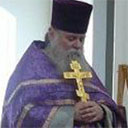Advertising men tell us that before a new product goes on the market, the public must be prepared for it through an ad campaign. The purpose of this campaign is to put the public into the right frame of mind to accept and to buy the new product.
If we look at the world’s history before the time of Christ, we see that mankind was likewise prepared for His coming. God did not send His Son into the world unannounced, but He readied a nation to bring Him forth and educated mankind to receive Him and to accept His teaching. Theologians use, the terms “dispensation” or economy” for the process by which the salvation comes to the human racethrough our Lord’s Incarnation, Death, and Resurrection. The plan by which the world and the people in it were made ready for Christ is a part of that divine economy.
There were really two preparations for Christ. One was the preparation through Israel for His coming into the world. The other was the preparation of the rest of the human race, the Gentiles (non-Jews) to hear and receive the Gospel He preached and which His disciples carried beyond the boundaries of the chosen people.
The choice of Israel as the people through whom the Son of God was to come into the world begins with the covenant God made with Abraham, the ancestor of the Jews. “The Lord said to Abram: … I will make you a great nation, and I will bless you, and make your name great,… and by you all the families of the earth shall be blessed” (Genesis 12: 1- 3). The covenant was confirmed in the Law which God gave to Moses. The Law comprises the first five books of the Old Testament, but it is summed up in the Ten Commandments and further concentrated by our Lord as the Two Greatest Commandments: “You shall love the Lord your God with all your heart, and with all your soul, and with all your mind, You shall love your neighbor as yourself” (Matthew 22: 37, 39). The purpose of the covenant and the Law was to purify Israel, to make her a nation worthy of bringing forth the Savior of the world. From Israel also came the prophets, who foretold the coming of Christ, and described Him and His work The last and greatest of the prophets was St. John the Baptist, the Lord’s fore-runner (Mark 1: 2). His preaching was the prologue or introduction to Jesus’ own ministry. The greatest child of Abraham and the summit of the preparation of Israel is the Mother of God, the Virgin Mary, the one who gave birth to the Messiah.
The preparation of the pagan world to receive the Gospel was more complex. The known world at the time of Christ’s birth had achieved a peace and a unity such as it had never known before. The great philosophers of classical Greece (Socrates, Plato, and Aristotle) had turned men’s thoughts toward the higher questions of life: What is the purpose of life? What is good? What is morality? They also began to speak about one supreme God, instead of the many gods of their forefathers. The philosophers attempted to answer these questions, sometimes success-fully, sometimes not. More importantly, however, these philosophers and their teachings kindled in the minds of those around them the desire for an understanding of themselves and of the universe and a yearning for something higher, which could only be fulfilled by Christ.
The teachings of the philosophers and their desire for knowledge were spread throughout the known world of the time by the conquests of Alexander the Great. Though his empire fell apart soon after his death, Alexander gave to the world a single unified culture and a common language. Wherever men went, they encountered the same social structures and institutions, and they could speak to each other in Greek, their common language.
Shortly before Christ’s birth the pagan world was unified politically by Augustus Caesar, the first Roman Emperor. The Roman Empire added political unity to the cultural unity given by Alexander. Under Augustus the whole Mediterranean world enjoyed tranquility and peace under a single, efficient government. Travelers could pass freely from Arabia to Britain protected by the Rome’s array and navy and sped on their way by a network of well-built and well-maintained roads.
Thus the world was ready for the coming of the Savior and for the spread of His Gospel. . The world was at peace; travel to all parts of the Empire was safe; men could communicate their thoughts to one other in a common language. The philosophers had given mankind a thirst for spiritual understanding and had prepared thorn to accept the idea of one God who was a God of love and justice. The prophets of Israel had proclaimed the Law of that God and had foretold that He would send His Son to call all mankind to reconciliation with Him. The stage was set for the birth of the Child of Bethlehem, the event we commemorate this month in the Feast of the Nativity.
***


